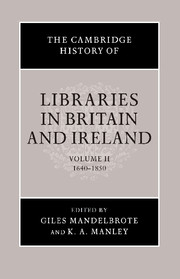Book contents
- Frontmatter
- 1 Introduction: the changing world of libraries – from cloister to hearth
- PART ONE THE EXPANSION OF BOOK COLLECTIONS 1640–1750
- 2 Ancients and moderns: cross-currents in early modern intellectual life
- 3 Libraries, books and learning, from bacon to the enlightenment
- 4 Opportunities for building collections and libraries
- 5 Libraries for school education and personal devotion
- 6 Libraries for the parish: individual donors and charitable societies
- 7 Endowed libraries for towns
- 8 Libraries in university towns
- 9 Ecclesiastical libraries: libraries for the higher clergy
- 10 Libraries for antiquaries and heralds
- 11 Professional collections: libraries for scientists and doctors
- 12 Personal owners of books
- 13 Library buildings and fittings
- 14 Baroque librarianship
- PART TWO LIBRARY DEVELOPMENT AT A LOCAL LEVEL
- PART THREE PROVINCIAL AND METROPOLITAN LIBRARIES 1750–1850
- Select bibliography
- Index
- References
6 - Libraries for the parish: individual donors and charitable societies
from PART ONE - THE EXPANSION OF BOOK COLLECTIONS 1640–1750
Published online by Cambridge University Press: 28 March 2008
- Frontmatter
- 1 Introduction: the changing world of libraries – from cloister to hearth
- PART ONE THE EXPANSION OF BOOK COLLECTIONS 1640–1750
- 2 Ancients and moderns: cross-currents in early modern intellectual life
- 3 Libraries, books and learning, from bacon to the enlightenment
- 4 Opportunities for building collections and libraries
- 5 Libraries for school education and personal devotion
- 6 Libraries for the parish: individual donors and charitable societies
- 7 Endowed libraries for towns
- 8 Libraries in university towns
- 9 Ecclesiastical libraries: libraries for the higher clergy
- 10 Libraries for antiquaries and heralds
- 11 Professional collections: libraries for scientists and doctors
- 12 Personal owners of books
- 13 Library buildings and fittings
- 14 Baroque librarianship
- PART TWO LIBRARY DEVELOPMENT AT A LOCAL LEVEL
- PART THREE PROVINCIAL AND METROPOLITAN LIBRARIES 1750–1850
- Select bibliography
- Index
- References
Summary
By the 1680s many English and Welsh parish churches had small collections of books, for reference, often chained to a book press or desk, for security. These are usually designated ‘desk libraries’ to distinguish them from slightly larger collections, designated ‘parochial libraries’. The term ‘parochial library’ came into use in the last decade of the seventeenth century, but is imprecise. In attempting to define and categorise libraries in parishes Kelly distinguished between ‘parochial libraries’ under the control of the ‘parochial authority’ and ‘parish libraries’ designed for the use of the inhabitants, and Canon Fitch suggested ‘parochial library’ should be applied to libraries in parish churches or parsonage houses, reserved, by the terms of a gift or bequest, for exclusive use by clergy. Fitch distinguished three categories of library: personal libraries bequeathed for the use of incumbents of parishes in perpetuity, usually housed in the parsonage house; libraries built up by donations, housed in churches; and libraries presented to a parish. For most ‘parochial libraries’ the distinctions are unclear. They were often also town, school or deanery libraries. Sometimes they were intended for reference only, or only for the use of the parish clergy; sometimes borrowing, by a restricted constituency, was permitted. They were almost always formally established by trust deed, bequest or formal rules.
In 1680 sixty-nine parochial libraries are recorded in England and Wales, two ‘town’ libraries in Scotland, at Edinburgh and Aberdeen, and none in Ireland. By 1760, 267 libraries are recorded in England, thirty-seven in Wales, eighteen on the Isle of Man and one in Ireland, and seventy-seven libraries had been distributed to Scottish parishes and presbyteries. Why was there such a burst of activity in providing books for parishes in the British Isles?
- Type
- Chapter
- Information
- Publisher: Cambridge University PressPrint publication year: 2006
References
- 2
- Cited by



